WW1 Diary
19th March 1919 Wednesday
A Chat with Ironside
All material produced or reproduced here and throughout this work is the sole copyright of the author and the family of Doctor D.C.M. Page MC
“On the following day General Ironsides (sic) inspected our Hospital and was very pleased with everything. He had quite a long conversation with me regarding Edinburgh and Elie. One of his staff officers had a beautiful fur coat on. One could not help wondering how many bottles of whisky he had given for it!”
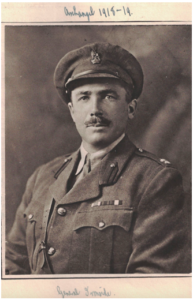
At this time although things must have been fairly relaxed for Douglas on Solombola Island, few recent entries in the diary might have indicated that not a lot was happening. General Ironside however was kept busy. March was spent with what for the General must have been a plate spinning time with trouble on the Pinega Front and also on the Railway Front. Rumours were rife that Seletskoe and Yametskoe had fallen which turned out to be mere gossip with no foundation.
Colonel Lucas the French Commandant whom Douglas first mentioned on the 4th of November 1918 and again on the 17th and 19th of that month, had his command ended on the 17th March. Ironside tells the story best in his account, (not always accurate as we’ve seen earlier).
“…On the 17thMarch he made an effort to visit his right column. It was the first time he had ventured to leave the railway. On his return he ran into an enemy attack which was being launched on the French post at Bolshoe Ozerky. His driver took fright and tipped him out in the snow. He wandered about for twenty-four hours in the forest, until he was happily picked up by a patrol and brought into the railway. Both his hands were badly frost-bitten and he had to report sick. I gave his staff officer Major Aarchen, two days in command but he proved himself incapable of taking charge. On a personal wire from a British staff officer I then decided to take over the command myself.”
Find out about our connection with Dr Page and an introduction to his diary here
18th March 1919 Tuesday
A Freezing Cold Fire!
All material produced or reproduced here and throughout this work is the sole copyright of the author and the family of Doctor D.C.M. Page MC
“There was a big blaze out our way on the night of March 18th. The Training Centre Officers’ Mess went on fire, and was gutted. The local fire-brigade, reinforced from Archangel, was early on the scene but could do nothing to quell the blaze with primitive hand-pumps and barrels of water! Luckily the officers were able to save their kits. We took ten of them in until other quarters were found for them. Although a strong wind was blowing, the fire did not spread at all. It was very cold – 25 degrees below zero.”
Find out about our connection with Dr Page and an introduction to his diary here
17th March 1919 Monday
Partying with Nurses on St Paddy’s Day
All material produced or reproduced here and throughout this work is the sole copyright of the author and the family of Doctor D.C.M. Page MC
“On Monday, March 17th, one of our Russian sisters – Sister Cheebanova – invited three of us along to her house for supper and music. Some of the other sisters were present also, and we had a great evening. Anybody might have thought that we had not seen food for months, to look at the heap of food which was put down in front of us as soon as we arrived. The food, which consisted mainly of fish, and jam pastries (sickening affairs), was washed down by copious draughts of weak, dish-watery tea. Not having starved exactly for months previously, I refrained from partaking too much of these delicacies. Afterwards we had music and dancing. I banged on the piano whilst the others threw themselves about like young elephants.”
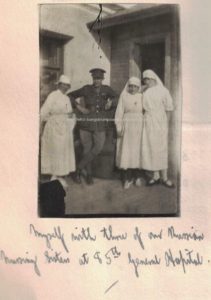
Find out about our connection with Dr Page and an introduction to his diary here
12th March 1919 Wednesday
A Meeting on HMHS Khalyan
All material produced or reproduced here and throughout this work is the sole copyright of the author and the family of Doctor D.C.M. Page MC
“On Wednesday, 12th March, there was a meeting of the Allied Medical Society on the Hospital Ship ‘Khalyan’. A big crowd of medical officers of all nationalities attended, and some very interesting cases were shown. The sisters gave us a delightful tea afterwards, and I was able to see Kennedy for a few minutes. He is now convalescing from a very severe attack of typhoid fever. His case was considered hopeless at one time, but he is now very cheery, I’m glad to say. I also saw Gilmour, our eye specialist, who is ill with pleurisy.”
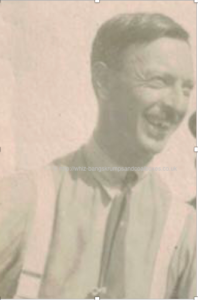
Captain Gilmour the eye specialist, pictured later in the year so he must have recovered from pleurisy. (Diary)
Find out about our connection with Dr Page and an introduction to his diary here
8th March 1919 Saturday
Intense Excitement
All material produced or reproduced here and throughout this work is the sole copyright of the author and the family of Doctor D.C.M. Page MC
“On March 8th the excitement in our hospital was intense. On that day the Colonel (God bless him!) performed the first operation in our beautifully appointed theatre. It was a great event. Nearly the whole staff crowded in to see the fun – an amputation of a finger! The Colonel was very nervous, and foozled things completely. I don’t remember how many pairs of gloves, rubber, officers for the use of, he destroyed that afternoon!”
Find out about our connection with Dr Page and an introduction to his diary here
1st March 1919 Saturday
Pancake Saturday!
All material produced or reproduced here and throughout this work is the sole copyright of the author and the family of Doctor D.C.M. Page MC
“Saturday, March 1st was ‘Pancake Saturday’, and a big holiday in Archangel. The streets were crowded. All the barishnas were out in their Sunday best, and most of the men were drunk. Lots of families drove up and down the Troitska in huge boat-shaped sleighs drawn by three or four horses.”
Find out about our connection with Dr Page and an introduction to his diary here
One Sunday …
An Italian Count Gets a Hangover
All material produced or reproduced here and throughout this work is the sole copyright of the author and the family of Doctor D.C.M. Page MC
“One Sunday some of the officers, including Count Campello, went along to dine at the Russian hospital. They evidently had a tremendous repast, and the wine had flowed freely for when I saw them on their return they all looked very flushed, and bleary about the eyes. The poor count suffered for days. He shut himself up in his room and if any of us went near him all we got was ‘B—–y whisky’ in his broken English!”
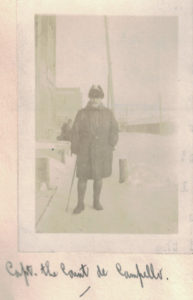
Find out about our connection with Dr Page and an introduction to his diary here
4th February 1919 Tuesday
Familiar Faces for Reinforcements and Tobogganing Fun
All material produced or reproduced here and throughout this work is the sole copyright of the author and the family of Doctor D.C.M. Page MC
“On February 4th some R.A.M.C. reinforcements arrived including Major Irwin, who was in charge of No. 2 Red Cross Hospital, Rouen, when I was a patient therein, Lt. Herman whom I knew well at the London Hospital in pre-war days, and Capt. Marshall who was with Scott at the South Pole. Colonel Thom, the new Director of Medical Services out here, also arrived with this batch. I hope he will tickle things up a bit. He has many ribbons on his chest.
The toboggan-run near G.H.Q. in Archangel afforded me much amusement when I saw it for the first time this week. It is a great affair. It starts from a height of about 100 ft. from the road-way, and slopes at first acutely, and then gradually, and then acutely again down on to the river. The whole run is about half-a-mile long, and is solid ice. Needless to say on a good toboggan a great speed is attained. The antics of several British sailors and their ‘barishnas’ amused me. Huge crowds were watching the fun, and a long queue was waiting to climb up to the top of the chute.”
Colonel Thom took over as Director of Medical Services at this time. He was born in Madras, India in 1870, but subsequently educated in Scotland at Dollar Academy which was founded in 1818. He studied medicine at Edinburgh University and graduated in 1893 as M.B. and C.M. He signed up to the R.A.M.C. in 1894 and from 1900 spent time in South Africa during the South African Wars. He returned to India around 1903 where he remained for about ten years. At the outbreak of the Great War he was back in Scotland training field ambulances at Bridge of Allan until 1915 when he was sent to Gallipoli. Here he managed the overseeing of removing wounded men from the beaches onto the hospital ships for which he was awarded the C.M.G.
He was recalled to the War Office and then became ADMS 32nd Division and DDMS 2nd Army Corps on the Western Front, for which he was further decorated with a C.B.
Almost three months after the Armistice he was sent out to Archangel to oversee all medical services. His area of responsibility was immense, being in charge of both Murmansk and Archangel fronts wherever Allied troops were operating. Despite there being a serious threat not only from the Bolsheviks but also from serious disease such as cholera, dysentery and smallpox, no serious outbreaks apart from dysentery occurred. For his work in Russia he was given a C.B.E.
Following his return to the UK and the War Office he became ADMS of Home Counties (West). Appointed Superintendent of the Royal Edinburgh Infirmary he died on 7thApril 1935.
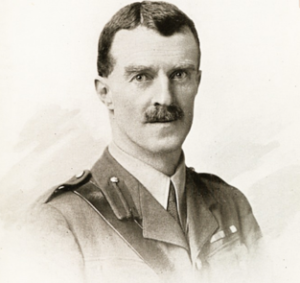
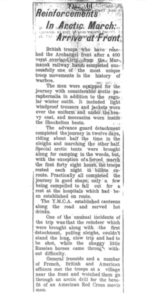
From the diary not credited
Find out about our connection with Dr Page and an introduction to his diary here
3rd February 1919 Monday
Tragedy at Shenkursk
All material produced or reproduced here and throughout this work is the sole copyright of the author and the family of Doctor D.C.M. Page MC
“On February 3rd we heard that Shenkhurst had been evacuated by our troops in the dead of night for military reasons. Our troops were withdrawn without the knowledge of the villagers, many of whom had been very friendly to us. When the unfortunate villagers got up next day they found the village to be full of Bolsheviks. Terrible scenes followed. Many people were shot, including the Mother-Superior of the convent in Shenkhurst. All the nuns, and many women and children of the village were raped, and dreadfully mutilated. Such is Bolshevism and British strategy!”
On the 24th and 25th January, Shenkursk over 400 kilometres from Archangel on the Vega River, fell to the Bolsheviks in one of the campaign’s most significant battles. It had been held by a joint force of a couple of hundred Americans of the 339th Infantry with support from another nine hundred or so of both British and the unreliable White Russian army.
Thousands of Bolsheviks flooded into Shenkursk and some villages in the surrounding areas, overwhelming the allied positions inflicting many casualties.
General Ironside had ordered immediate withdrawal fearing annihilation which was carried out by using the one trail out unseen by the Bolsheviks. Unaware of the timely escape by those that made it, the Reds continued to bombard Shenkursk before entering the town to find it abandoned by the Allies.
Douglas Page reported that the news had filtered through to Archangel about nine days later with an account of the terrible atrocities. Although he was clearly critical of the High Command the outcome was the inevitable result of the allied force being severely understrength to carry out such a campaign and highlighted the folly of trying to recruit a Russian army to fight other Russians. When it came to serious fighting the White Russians often refused or tried to abscond or defect to the Bolsheviks.
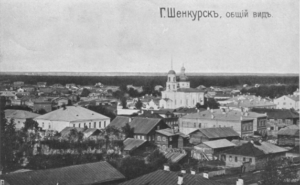
More peaceful Shenkursk in 1917
Find out about our connection with Dr Page and an introduction to his diary here
1st February 1919 Saturday
Northern Lights
All material produced or reproduced here and throughout this work is the sole copyright of the author and the family of Doctor D.C.M. Page MC
“On the 1st February there was a wonderful display of Aurora Borealis at night. It was like a green rainbow waterfall!”
For those that would like to experience the sight for themselves.
Find out about our connection with Dr Page and an introduction to his diary here